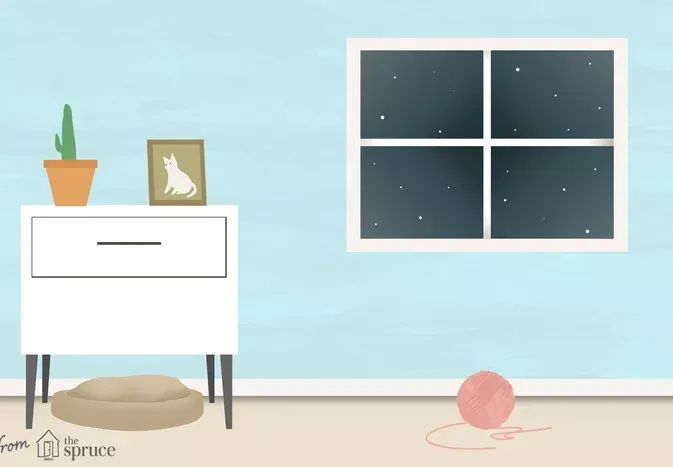What to Do When Your Cat Dies at Home
Updated on 04/26/24

What to Do When Your Cat Dies at Home: A Comprehensive Guide to Handling Loss with Grace and Care
The loss of a beloved pet is an undeniably heart-wrenching experience, and when that pet is a furry feline companion, the pain can be profound. The bond between a cat and its human is unique and irreplaceable, making their passing a time of intense grief and sorrow.
If your cat has recently passed away at home, it's crucial to handle the situation with compassion, practicality, and a deep understanding of the emotional toll it takes. This comprehensive guide will provide you with step-by-step guidance on what to do in the immediate aftermath and beyond, helping you navigate the difficult path of loss with grace and care.
Step 1: Confirming Death and Seeking Closure
* Confirm Demise: Gently check for signs of life, such as breathing, heartbeat, and corneal reflex (when you touch the eye, the pupil should constrict). If there is no response, your cat has passed away.
* Close the Eyes: Gently close your cat's eyes to provide a sense of peace and closure.
* Handle with Care: Treat your cat's body with respect and dignity. Avoid unnecessary movement or manipulation.
Step 2: Dealing with Immediate Emotions
* Allow Yourself to Grieve: Recognize your emotions and give yourself permission to feel the pain. Allow yourself time to cry, scream, or simply sit in silence.
* Talk to Someone: Reach out to a trusted friend, family member, or therapist to share your grief. Talking about your loss can help you process your emotions.
* Take Care of Yourself: Remember to eat, drink, and sleep. Self-care is essential during this difficult time.
Step 3: Practical Considerations
* Contact Your Veterinarian: Inform your veterinarian about your cat's passing. They can provide guidance, support, and assist with cremation or burial arrangements.
* Choose a Resting Place: Decide where you want your cat to be laid to rest. Options include burial in your backyard, cremation with ashes returned to you, or communal cremation.
* Handle the Body Safely: If your cat dies due to a contagious disease, contact animal control or your veterinarian for proper disposal.
Step 4: Memorializing Your Cat
* Create a Memorial: Honor your cat's memory by creating a special place in your home, planting a tree in their honor, or making a photo album or scrapbook.
* Share Memories: Talk about your cat with others who knew and loved them. Share stories, anecdotes, and photos to celebrate their life.
* Consider a Ceremony: Hold a small ceremony or gathering to say goodbye and honor your cat's spirit.
Step 5: Moving Forward with Grief
* Allow Time to Heal: Grief is a process that takes time. Don't expect to "get over" your cat's passing overnight.
* Seek Support: Join a pet loss support group or connect with others who have experienced similar losses.
* Remember the Joy: Focus on the happy memories you shared with your cat. Remember the love, companionship, and joy they brought into your life.
Examples to Illustrate Practical Considerations
* Burial: If you choose to bury your cat in your backyard, dig a hole deep enough so that predators cannot reach the body. Place your cat in a biodegradable box or wrap them in a blanket. Cover the grave with soil and consider planting flowers or a small tree as a memorial.
* Cremation: Contact a local pet crematorium to inquire about their services. Choose between individual cremation, where your cat's ashes are returned to you, or communal cremation, where ashes are scattered in a pet cemetery.
* Contagious Disease: If your cat dies from a contagious disease like parvovirus, it's crucial to contact animal control or your veterinarian immediately. They will provide instructions on how to safely dispose of the body to prevent the spread of the disease.
Examples to Illustrate Memorialization
* Creating a Memorial Space: Designate a special corner in your home as a memorial to your cat. Display their favorite toys, photos, and other mementos. Light a candle or incense to honor their memory.
* Memorial Album: Gather photos, letters, and other keepsakes that remind you of your cat. Create a scrapbook or photo album to preserve their memories for generations to come.
* Pet Loss Support Group: Connect with other pet owners who have experienced loss. Share stories, offer support, and learn from each other's experiences.
Remember, the loss of a cat is a deeply personal and emotional experience. There is no right or wrong way to grieve. Allow yourself the time and space you need to heal. Honor your cat's memory, and cherish the love and companionship you shared.
Explore More Pets

Cat Behavior Problems
How to Stop Aggression in Kittens

Long-Haired Cat Breeds
Siberian Cat: Breed Profile, Characteristics, & Care

Cat Behavior Problems
How to Stop Kittens From Scratching and Biting

Long-Haired Cat Breeds
Turkish Angora: Cat Breed Profile, Characteristics & Care

Basic Training
How to Socialize Your Kitten

Short-Haired Cat Breeds
Cute Pictures & Facts About Calico Cats & Kittens

Litter Box Training
Training Your Kitten to Use the Litter Box

Long-Haired Cat Breeds
10 Fun Facts About White Cats